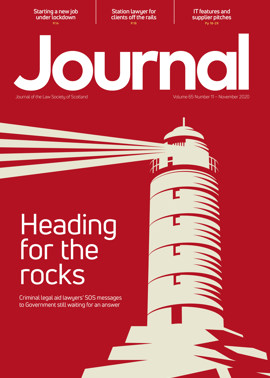Editorial: November 2020
There is no doubt that the COVID-19 lockdown and its aftermath (or possible revival) has seen winners and losers across the spectrum of legal practice. But few will be enduring travails to the extent of the legal aid sector, and criminal defence in particular.
What had already become a precarious existence due to rates of pay that required costs to be kept to a bare minimum in order to make a living, has effectively become unviable due to the reduced throughput of cases since March. The Society’s success in negotiating interim payments and other concessions from the Scottish Government and SLAB helped immediate cash flow, but was never going to achieve more than that: fewer cases simply mean less income.
Summary cases are taking up more time as well, with new procedural requirements and, if a virtual trial is involved, necessary setup time. Hence while it may cause an initial double take that the Society has appealed for a 50% across-the-board rise for legal aid fees at the present time – in addition to grant assistance based on recent levels of work – it is no more than can reasonably be claimed in our changed circumstances.
With SLAB having an unexpected underspend for the year to date due to the lockdown, one might think there would be room for an accommodation here. Sadly, things are never that simple: the Scottish Government has been slow to accept the Society’s case, and negotiations have dragged on much longer than Ian Moir and his team hoped at the outset. So much so that the Glasgow Bar Association has written a somewhat despairing letter to Holyrood’s Justice Committee to see if it can bring any further pressure to bear.
Small wonder, then, that the concerns regularly voiced since early in the century for the future of the sector, with too few new lawyers being attracted to criminal defence work – or sometimes being able to find an employer even if they are – are now being heard more urgently than ever.
To their credit, the group who have formed New Generation Lawyers, to campaign for a properly funded legal aid system and sufficient opportunities for those they believe would take up this work if they could, have taken up the fight. While they have yet to formulate their own proposals, they are appealing for the information on which to base these, as our lead feature sets out.
No one should expect quick results from their initiative, but it is a welcome move and one of the few recent developments to give any cause for optimism over the future. They deserve all the support they can get.
Regulars
Perspectives
Features
Briefings
- Civil court: keeping justice on the rails
- Employment: Time for a redundancy refresher
- Family: Watch your step with behaviour-based divorce
- Human rights: Inner House message in privacy group chat
- Pensions: The future – the regulator's blueprint
- Scottish Solicitors' Discipline Tribunal
- Crofting law reform: time to act
- In-house, online and in demand
In practice
- Paralegals: 10 years of recognition
- Ask Ash: Too busy, but still insecure
- Property pitfalls: problematic but preventable
- The Word of Gold: Count us out
- Prepare for the tax due date
- The Eternal Optimist: Help to turn the corner
- Appreciation: Ross Paton
- Appreciation: Claire Reilly (Robertson)
- Tenancies succession reminder






